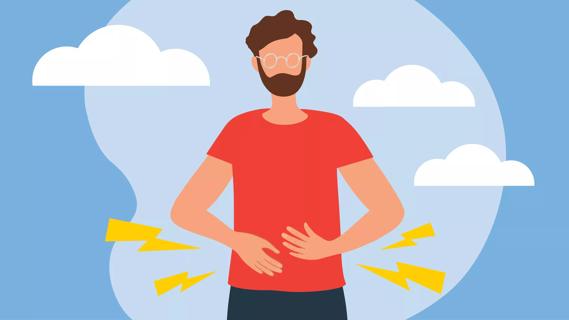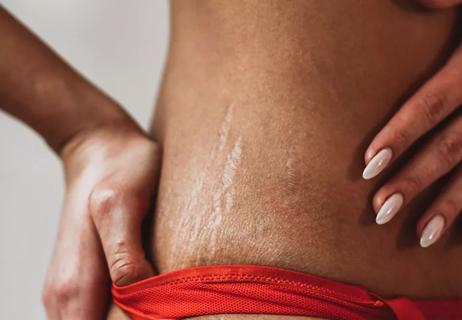They’re a normal, common side effect of abdominal surgery

After you have certain kinds of abdominal surgery, you can expect to have some internal scars. Also known as abdominal adhesions, they’re tough tissue bands that form between your abdominal tissues and organs.
Advertisement
Cleveland Clinic is a non-profit academic medical center. Advertising on our site helps support our mission. We do not endorse non-Cleveland Clinic products or services. Policy
The idea that you have internal scarring might make you worry about the potential for future health complications — or the possibility of needing more surgery down the line.
But colorectal surgeon Anuradha Bhama, MD, reassures that abdominal adhesions generally won’t cause you issues.
Here are five things to know about this scar tissue.
Abdominal adhesions are normal — and common. In fact, 93% of people who have abdominal surgery develop at least one adhesion.
“Any time you have surgery in your belly or pelvis, you have a chance of developing abdominal adhesions,” says Dr. Bhama. “This is normal scar tissue. Just like you might have scars on your skin, you can have scars inside your body as well.”
In other words, you didn’t do anything to cause these abdominal adhesions. They’re a normal result of the post-surgery healing process.
Dr. Bhama also notes that you can’t do anything to prevent abdominal adhesions. And the number of abdominal adhesions you develop can vary.
“It’s impossible to predict what the scar tissue inside your body is going to look like,” she adds. “I’ve seen people who have had one operation develop a severe abundance of scar tissue. But I’ve also seen people who have had several operations with minimal scar tissue.”
Advertisement
Factors that might influence how severe your abdominal adhesions are include:
In addition, adhesions can form if blood or blood clots aren’t washed away after a procedure or if your organs dry out during the operation.
Most abdominal adhesions don’t cause symptoms. But in rare cases, they can cause complications. For example:
Dr. Bhama also notes that after you’ve had surgery in your abdomen or pelvis, you’re at risk of developing a bowel obstruction from abdominal adhesions.
“Scar tissue can cause a blockage,” she explains. “And then, your intestines might swell, and that’s why things get backed up.”
Crampy gas pains are usually the first symptoms to appear, Dr. Bhama continues. “Other warning signs include bloating, nausea, vomiting and constipation. You have episodes where you’re not passing gas and not having stools and are bloated. It feels like there’s a blockage.”
The good news is it’s “exceedingly rare” to need surgery to address abdominal adhesions, stresses Dr. Bhama. “If you don’t have any problems from the adhesions — and the vast majority of people don’t — then, you don’t need to consider surgery or even be evaluated for surgery.”
One of the reasons doctors avoid doing surgery for scar tissue is that they can’t prevent or predict whether you’ll develop new scar tissue. “For example, if you had a scar on your arm removed, there’s no way to ensure that you won’t have future scar tissue build up,” Dr. Bhama says. “It could leave another scar behind.”
If you’re one of the rare people to develop a bowel obstruction from abdominal adhesions, “80 to 90% of the time” these can also be resolved without surgery, Dr. Bhama states.
Sticking to a clear liquid diet often helps clear up any blockages in a day or two. If your discomfort doesn’t go away — and if your symptoms worsen — a visit to the ER might be in order.
“If you’ve never experienced a blockage before, it’s recommended you go to the emergency room and get evaluated to ensure you’re not too dehydrated,” advises Dr. Bhama. Providers can diagnose bowel obstructions either with CT scans or with X-rays of your abdominal cavity or intestines.
Advertisement
But even if you’re admitted to the hospital, she adds that surgery for a bowel obstruction isn’t inevitable.
“Typically, decompressing your stomach with a tube that goes down your nose, along with getting IV fluids and resting your bowels, will help resolve the obstruction so that you don’t need surgery.”
If you have repeated bowel obstructions over and over again to the point that it’s impacting your quality of life, ability to work and ability to participate in social activities, surgery may be warranted. This is extremely rare, Dr. Bhama reiterates.
“For example, I saw someone who was admitted twice a year for six years in a row after rectal cancer surgery,” she says. “And after thorough imaging, it was determined this was being caused by scar tissue. The blockage was always the exact same spot every time. In this case, I did perform surgery, which helped resolve the recurrent obstructions.”
Dr. Bhama says it’s a misconception that having abdominal adhesions will prevent you from getting other needed surgeries.
“I hear this a lot,” she says. “People will say, ‘The surgeon told me I can’t have any more surgery in my abdomen.’ But you can’t predict how severe adhesions will be, so if someone has said you’re not a candidate for surgery based on the likelihood of adhesions, I’d get evaluated at a specialty center.”
Advertisement
At the end of the day, you can’t prevent abdominal adhesions from forming — and you can’t minimize your chances of developing them. That can be frustrating. But for most people, abdominal adhesions are something they live with and don’t impact their day-to-day life.
Advertisement
Learn more about our editorial process.
Advertisement

Early attention to skin wounds can help minimize their appearance later

Eat foods that are high in protein and low in animal fat and simple sugar

Your scar will heal best if you keep the area clean, dry and covered for an appropriate amount of time

Depending on the type of hernia, complications like pain and infection may arise in the months and years following treatment

Skip the butters, creams and oils and instead try tretinoin — or just let time work its magic

A painful, swollen abdomen from endometriosis may be managed with dietary changes

Slow-to-digest food can lead to a gas buildup

The #1 tip is to eat foods that help you with a #2

Start having sex about 72 hours before ovulation, then at least every other day during your fertile window

Attachment theory suggests that your earliest relationships shape connections throughout your life

It isn’t a recognized mental health disorder, but research shows that problematic social media use can negatively affect your mental health, self-esteem and sleep